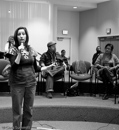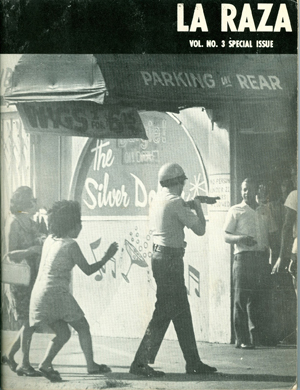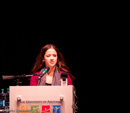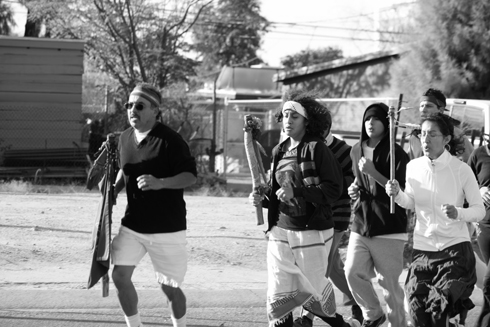Did you know that Truthout is a nonprofit and independently funded by readers like you? If you value what we do, please support our work with a donation.
On a crisp Tucson morning, we gather at A Mountain. Indigenous teachers from Chihuahua to Chiapas and from Jalisco to the Yucatan go into the crater. It is Sat. Dec 4. They are joined by Yaqui, Hopi, Dine, Apache, Mexica and Raza runners from Tucson and from throughout the United States. From elders to young children. On this morning, between 60-80 of us run from the base of the mountain through Menlo Park and Barrio Hollywood on this ceremonial six-mile run, led by Calpolli Teoxicalli.
The run is in defense of Ethnic/Raza/Indigenous Studies. And it is no accident that it ends at the historic El Rio Neighborhood Center – created 40 years ago when grandmothers and other barrio residents climbed the fences of an elite golf course, taking it over while setting in motion the creation of the city’s first community center.
Once again, we spoke with our feet. We left footprints. We created a path. And we celebrated. And for the rest of the day, the community of Tucson is treated – via a floricanto – to the powerful voices of the likes of Cherrie Moraga, Francisco Alarcon, Leslie Marmon Silko, Elias Serna, Felicia Montes, Teatro Izkalli and El Vuh.

But I’m getting ahead of myself. This is the third day of an international conference examining hate, censorship and forbidden curriculums. While nationally recognized scholars come to share their knowledge and wisdom, it is also a time when 4th and 5th grade students from Tucson’s Raza Studies Program (Ochoa and Buskirk) showcase their critical thinking skills, challenging state officials to visit their threatened-with-extinction classrooms.
The conference is convened because we are but days – Dec 31 – from when the state is supposed to rule TUSD’s highly successful Mexican American Studies program to be “out-of-compliance.” Only in Arizona would a program, that graduates 97.5% of its high school students and sends more than 70% to college, would be facing the threat of elimination. This at a time when dropout rates for Mexican Americans can reach as high as 60% (Students recently jam-packed a TUSD school board meeting, demanding that the board stand firmly behind the program. They did so with a night vigil and a symbolic protest).
Several weeks before, high school Raza Studies students organized a 13-mile walk between Palo Verde and Cholla high schools. When the anti-Ethnic Studies legislation was signed this past May, it was hundreds upon hundreds of middle and high school students who laid siege to first, the TUSD headquarters, and then the state building. It resulted in the detention of 15 (eight are still on trial for criminal trespass). The threatened elimination of Raza Studies is no small matter. The new state school superintendent also now has vowed to eliminate Ethnic Studies at the University level.
This is the context for this conference. On this first day, undergraduates and graduate students examine the legislative attacks in the realm of immigration (sb 1070) and education (hb 2281). In reality, they are attacks on our physical bodies (the racial profiling is Indigenous) and on our spirits (they want our souls, but they can’t have them). More attacks are on their way (one forthcoming legislative proposal would nullify the 14th Amendment on Arizona and another would require children to identify the immigration status of their parents) and these are but the opening salvos for copycat statewide legislation nationwide. Graduate students examine the works of Paolo Freire (Pedagogy of the Oppressed) and Rodolfo Acuña (Occupied America); works that have been singled out by the states’ school superintendent as being un-American because they purportedly call for the violent overthrow of the U.S. government and lead to “segregation.” (Yes, this is Arizona… where this superintendent is now the state attorney general).

Scholars Andrea Romero, Ana Ochoa O’Leary, Auggie Romero and Randall Amster, provide the data and prove the success of Raza Studies and contextualize the attacks against it within the politics of dehumanization. The conference on forbidden curriculums is also contextualized relative to the Tlatelolco massacre in Mexico City (Professor Celeste Bustamante) and the National Chicano Moratorium (Ramses Noriega) in Los Angeles, along with two Tucson HS students, Ashley Bustamante (one of the organizers of the 13-mile walk) and Carmen Orozco — who comment on the significance of the 1970 death of journalist, Ruben Salazar.

Photo by Raul Ruiz
In the evening, students again speak for themselves, leaders from Tucson, Pueblo and Sunnyside high schools and Pima Community College and the University of Arizona. Raza Studies educators – including several of the 11 plaintiffs who have filed a lawsuit against the state in defense of Raza Studies – update the participants. This includes Sean Arce, Alzira Duncan, Lorenzo Lopez, Rene Martinez, Jose Gonzalez and Norma Gonzalez. One highlight includes the ceremonial presentation of El Coraje Newspaper from the 2010 editors (Karina Salazar, Gerardo Villalobos and Lizeth Grijalva) to the 1960s editors (Guadalupe Castillo, Salomon Baldenegro, Ceci Cruz and Frank de la Cruz). An exhibit on the same topic was unveiled at the beginning of the conference. Another highlight is the presentation of a trailer for the forthcoming, Precious Knowledge, a PBS documentary by Ari Palos and Eren McGinnis, that tells the Raza Studies story. Capping the evening was the powerful voice of elder Raquel Rubio Goldsmith.

Day 2 was of a historic nature, beginning with a session by teacher Armando Cauich from the Yucatan, on the topic of J’meen – a Maya concept of knowledge. This is the proper context; it is Indigenous or maiz-based knowledge that undergirds the Raza Studies program. It is this knowledge that has been prohibited or discouraged for many centuries, including now, when the state superintendent is claiming that this knowledge is “Un-American.”
The context of day two is decolonization and liberation – from understanding the role of the media, to understanding the importance of organizing. Amid this talk, or at the end of these morning sessions, in walk a classroom of pre-K students from Ochoa Elementary. They recite In Lak Ech:
Tú eres mi otro yo. Si te hago daño a ti, Me hago daño a mí mismo. Sí te amo y respeto, Me amo y respeto yo. You are my other me. If I do harm to you, I do harm to myself. If I love and respect you, I love and respect myself.
A lot of eyes well up. We all understand theory and the importance of analysis, but in these 4-year olds, we concretely understand what’s at stake. It is humbling, particularly for scholars who have traveled great distances to understand this insane asylum we call Arizona. Most scholars already know about the extremists, who work primarily at the state capitol; what they perhaps did not know about were these 4-year-olds… the elementary, middle and high school students and the college and university students, who both defend their program and who organize resistance and who powerfully represent and speak for themselves.
In effect, the rest of the afternoon and evening are anti-climactic, yet it continues to build into a crescendo (see the program here). It includes sessions on historical trauma for Indigenous peoples (Tommy Begay), and the Latino threat narrative (Teresa Carrillo) and it includes talks and responses from movement veterans, such as Carlos Montes and Rosalio Muñoz. It also includes special words from elder/professor and writer, Simon Ortiz.

Key to the conference is understanding Arizona voices. Tupac Enrique Acosta and Carlos Garcia of Tonatierra and Puente, respectively, give participants not simply an update regarding the resistance in Phoenix, but more appropriately, contextualize it as both as part of a continental movement and local organizing. From Tonatierra, we get the proclamation that: “We can never be immigrants on our own Continent” and the understanding that the Arizona legislation of the past few years has not produced [legitimate] laws. While perhaps people came to hear the specifics of the lawsuit – and they did – they were not disappointed. Richard Martinez, the pro-bono attorney that is representing the 11 plaintiffs spoke to the legal significance of the lawsuit. In effect, it is the equivalent of the Monkey Scopes Trial. This lawsuit will settle once and for all, the legality, the legitimacy and the propriety of teaching Ethnic Studies and it will challenge notions of what is Ethnic vs what is American, and thus, what is “UnAmerican”.

What is perhaps unexpected are the voices of Sandy Soto, Raul Al-qaraz Ochoa and Celia Rodriguez. They break down for the audience the intersection between Arizona hate and homophobia. More than brilliant analyzes, they speak to the notions of that you cannot speak of liberation while silencing the voices of the LGBT community. Similarly, speakers from the O’odham Solidarity Across Borders Collective, those that took over the Tucson Border Patrol station in June, remind us that the Arizona laws in question are assaults not just on [Indigenous] migrants, but against Indigenous peoples, such as the O’otham, along the border region. Conversely, the resistance is also coming from not just the migrant sectors, but also from Indigenous peoples of this region also (Incidentally, the trials for those from this collective for criminal trespass are now scheduled for February).

After Dolores Huerta speaks – and her importance to Arizona and the Raza Studies struggle was recently highlighted here – the evening ends with three powerful Arizona voices: Michelle Rascon, Leilani Clark and Isabel Garcia. Each embody the purpose of the conference. Michelle, aside from being a Raza Studies graduate and phenomenal poet, was recently in the news because her father was picked up by the FBI, under false pretenses, and turned over to ICE agents. Her father is now facing the possibility of many years in prison. Since 2006, Leilani has perhaps best represented the youth voice in the struggle to defend Ethnic/Raza Studies. Isabel – much maligned by the right wing, including Sheriff Joe Arpaio – symbolically represents the voice of Tucson – the voice of Arizona. She is who reminds us that it is not for us to compromise on anyone’s human rights.
In effect, that was the purpose of the entire conference; to expose the nation to the resistance-creation culture that is developing here in the panza of the beast. We can learn from others, but also, others can also learn from us.

On the third day, that’s where we met at the base of the crater – not to hear each other per se, but to partake in ceremony. And we did. We spoke with our feet. We left footprints. We created a path. And we celebrated.
· This is but a glimpse of the conference. Fortunately, virtually the entire conference was recorded and documented and will soon be made available, along with a conference report. For photos of the conference, go to: https://chicanamagazine.blogspot.com/2010/12/missed-conference.html
*All participants who asked for housing and transportation were accomodated, thus the imprint on the state economy was minimal — this while supporting and collaborating with Arizona Movement educators, organizers and activists.
Contributions are still being accepted to cover the costs of both the conference and its documentation. Go to: https://drcintli.blogspot.com/
* Photos by Chris Summitt
Rodriguez, a professor at the University of Arizona, can be reached at: [email protected]
A terrifying moment. We appeal for your support.
In the last weeks, we have witnessed an authoritarian assault on communities in Minnesota and across the nation.
The need for truthful, grassroots reporting is urgent at this cataclysmic historical moment. Yet, Trump-aligned billionaires and other allies have taken over many legacy media outlets — the culmination of a decades-long campaign to place control of the narrative into the hands of the political right.
We refuse to let Trump’s blatant propaganda machine go unchecked. Untethered to corporate ownership or advertisers, Truthout remains fearless in our reporting and our determination to use journalism as a tool for justice.
But we need your help just to fund our basic expenses. Over 80 percent of Truthout’s funding comes from small individual donations from our community of readers, and over a third of our total budget is supported by recurring monthly donors.
Truthout’s fundraiser ended last night, and we fell just short of our goal. But your support still matters immensely. Whether you can make a small monthly donation or a larger one-time gift, Truthout only works with your help.
